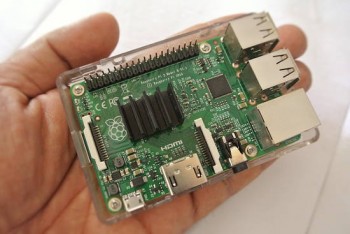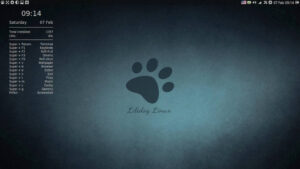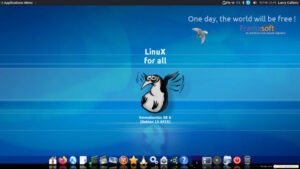The Raspberry Pi Report
The Raspberry Pi managed to cram a lot of history into only 29 days this February, even without mentioning the introduction of the Pi 3 on Monday.
The month of February kept up with the trend of bigger and better things happening in the Raspberry Pi world. From new games to updates from the International Space Station, things keep moving on for the Raspbery Pi and the Raspberry Pi community. While quite a few things happened this past month, here’s a summation of the biggest stories.
 More distros to choose from – February marked the arrivial of several new distros that Raspberry Pi users can now install. Tizen 3.0, Chromium 0.4 and Manjaro-ARM are available to download for the Raspberry Pi 2. The Manjaro-ARM project now allows Raspberry Pi users to enjoy Arch Linux without having to do an Arch install and is also broken down into four different editions. Media, Server, Basic and Minimal editions all cater to situations that most Raspberry Pi users fall into. Tizen users will be excited to see that Tizen 3.0 is now fully functional on the Raspberry Pi 2. This is a great move, since more users will be introduced to the Tizen platform who might not have had a chance to experience it before. Last, but not least is the release of Chromium 0.4. Chromium was already available, but with kernel improvements and more memory storage, version 0.4 is leaps and bounds ahead of Chromium 0.3
More distros to choose from – February marked the arrivial of several new distros that Raspberry Pi users can now install. Tizen 3.0, Chromium 0.4 and Manjaro-ARM are available to download for the Raspberry Pi 2. The Manjaro-ARM project now allows Raspberry Pi users to enjoy Arch Linux without having to do an Arch install and is also broken down into four different editions. Media, Server, Basic and Minimal editions all cater to situations that most Raspberry Pi users fall into. Tizen users will be excited to see that Tizen 3.0 is now fully functional on the Raspberry Pi 2. This is a great move, since more users will be introduced to the Tizen platform who might not have had a chance to experience it before. Last, but not least is the release of Chromium 0.4. Chromium was already available, but with kernel improvements and more memory storage, version 0.4 is leaps and bounds ahead of Chromium 0.3
New games available – The Raspberry Pi already has some great games installed and available, but the month of February added some more noteable titles to the list. YoYo Games announced three free games with more to come in the coming months. “They Need To Be Fed,” “Super Crate Box” and “Maldita Castilla” all provide classic arcade action in look, feel, and game play. These games were designed to run on Raspbian Jessie and do require more GPU RAM than the norm, so configuration will have to be applied to the Raspberry Pi’s GPU memory. Webfoot Games also announced that most of their game catalog, which is 100 plus games, would be ported to the Raspberry Pi. Due to licensing issues, the games are taking a bit longer to port than initially expected. Webfoot Games will be releasing several games a week to see how much interest is generated from each set of releases. The games released from Webfoot will also require additional GPU RAM, so the same steps to configure the memory will need to be taken.
Raspbian receives an update – The Raspberry Pi’s most famous operating system has once again received an update that puts Raspbian back at the top. Just about every application on Raspbian received additional functionality and bug fixes, such as Sonic Pi, Mathematica and Node-RED. Both the key wiring libraries received updates, which now allow WiringPi to access the GPIO pins without the need to use “sudo” and bug fixes for RPi.GPIO. Easily the biggest feature of this update is the fact that Raspbian now ships with an experimental OpenGL driver, which uses the GPU to provide for better hardware acceleration. The OpenGL driver is turned off by default and only works for the Raspberry Pi 2. For those looking to test the OpenGL feature, there are some programs available to download for Raspbian that will allow you to see the increase in frames per second and improved screen refresh rate.
RetroPie 3.5 released – Transforming your Raspberry Pi into a retro gaming station is a really fun and easy project to do when you use RetroPie. This month the RetroPie folks announced the release of RetroPie 3.5. This new release provides a simpler user experience when installing RetroPie and also fixed some bugs related to Raspbian Jessie. Some new key features are new experimental modules, NTFS support by default, improvements to EmulationStation, PS3 controller improvements, and improvements to the Runcommand Launch Menu.
Latest news from Astro Pi – We also received updates from the AstroPi project this month. The two Raspberry Pis, Ed and Izzy, are currently performing experiment after experiment at the space station. This month, Ed was successfully deployed by Tim Peake and was running the Crew Detector project, which was created by students. Expect more news from space next month as Tim continues to use both Ed and Izzy in his day to day activities aboard the ISS.
We’re currently in the midst of our 2016 Indiegogo fundraising drive. Your support is crucial. Won’t you please visit our fundraising page and make a contribution to support FOSS Force?
In addition to hosting a Raspberry Pi meetup in Washington D.C., Isaac Carter is a co-host on mintCast. He’s also a software engineer who enjoys working with Java, JavaScript, and GNU/Linux. When he’s not coding, you can find him reading on any number of subjects or on the golf course.






